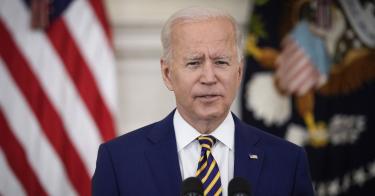We haven’t heard much lately about the “infrastructure” plan the Biden administration released in March. But the plan’s fate has been subject to behind-the-scenes debate since then.
Following several fruitless rounds of discussion between President Biden and Sen. Shelley Moore Capito, West Virginia Republican, bipartisan groups are working on plans of their own. At the same time, both the House and the Senate are producing “highway bill” packages that cover highways, rail, transit, and more.
Although Republicans lack control of both chambers, razor-thin majorities mean that they still exercise leverage. However, they are vulnerable to several traps.
Trap #1: Negotiating from left-of-center
Everyone expected the Biden administration to release an infrastructure proposal, but its contents were genuinely shocking: massive taxes on private investment at the exact time the economy needs it most, and huge amounts of spending on things with no connection to infrastructure.
>>> 4 Big Problems With Biden’s “Infrastructure” Plan
With the Biden plan being far left of the long-standing bipartisan status quo, Republicans have struggled to make headway during negotiations.
Yet this does not excuse a mistake made at the outset: agreeing that any plan would increase the amount of federal spending and control over infrastructure. Rather than starting from the right and pulling Mr. Biden to the center, Republicans started with spending increases and were pressured to move even further left.
In reality, federal infrastructure policy is littered with carve-outs for left-wing interest groups that drastically reduce the value of spending. That means the cost to taxpayers outweighs the economic benefit.
Republicans must recognize that when they allow a debate to focus on how much to grow the federal government, they’ve already lost.
Trap #2: Producing a bipartisan boondoggle
The development of bipartisan infrastructure proposals is reminiscent of what happened with the COVID-19 stimulus in late 2020.
House Democrats produced a hard-left stimulus bill, and for months House Speaker Nancy Pelosi refused to budge from demands for trillions of dollars in unjustified spending. This stalemate was broken in December when a bipartisan group formed to craft a package that was smaller than what Mrs. Pelosi wanted (but still very large).
The new package was bipartisan, but it wasn’t a good policy. Instead, it was loaded with special-interest bailouts and unnecessary handouts to state and local governments.
We are witnessing an unfortunate repeat unfold. Outlines of two bipartisan infrastructure packages have been released, one from the House and one from the Senate. Sadly, both proposals would radically increase federal spending.
But big-spending comes with a big price: huge amounts of waste, economically destructive tax hikes, an even higher national debt, or all three.
It would be a mistake for Republicans to allow a bipartisan infrastructure package to deepen the swamp.
Trap #3: Allowing a reconciliation backdoor
Earlier this year, Democrats produced a $1.9 trillion spending package falsely marketed as COVID-19 relief. They used the legislative procedure known as reconciliation to pass the bill on party lines.
There has been ongoing speculation about whether they would attempt the same maneuver with infrastructure. However, Democrats face two hurdles to doing so.
First, key programs funded through the Highway Trust Fund are ineligible for reconciliation due to their unusual budgetary treatment. These programs expire on Sept. 30, and the only way to maintain the long-standing programs is to get bipartisan support.
Second, Democrats are vulnerable to having reconciliation fail if they lose a single vote within their Senate caucus. Thus, Democrats have a strong incentive to work with Republicans on the issue.
Yet that still leaves Republicans with a glaring vulnerability. It’s possible for Democrats to work across the aisle on an infrastructure package that includes highway bill programs, then use reconciliation to pass the huge amount of non-infrastructure spending in the Biden plan.
>>> Biden Embraces California’s Zombified Rail Boondoggle
Senate Democrats are weighing up to $6 trillion in new spending, which would make it the largest bill in history. Most of that amount would go towards expanding the welfare state, not infrastructure.
So what should Republicans push for during infrastructure negotiations?
First, they must receive strong public assurances that Democrats won’t use reconciliation to get the remainder of their spending demands. Otherwise, negotiations are not being done in good faith.
Second, Republicans should promote changes that would improve the value of America’s infrastructure investing.
This could include providing more flexibility to state governments and the private sector to raise and spend their own funds; reforming federal red tape that adds billions of dollars and years of delays to construction costs, and focusing federal funds on projects that will generate value rather than checking political boxes.
Finally, Republicans must seek to rein in federal spending rather than rubber-stamping yet another wasteful spree.
Congress has a tremendous opportunity to write an infrastructure bill that would put the public good ahead of political benefits. But it needs to avoid all the potential pitfalls along the way.
This piece originally appeared in The Washington Times



